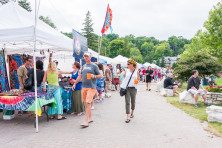Future Uncertain for Midwest Sunsplash
- Share
- Tweet
- Pin
- Share

The 2,000 people who were expected at Midwest Sunsplash in Sister Bay failed to materialize.
Poor weather and low attendance are leaving a questionable future for the Midwest Sunplash music festival, which took place in Sister Bay last weekend. Rain plagued the festival on Friday before organizers reduced the cost of entry to get people through the gate on Saturday.
Sister Bay Village Administrator Zeke Jackson is still optimistic about the impact of the festival on the village.
“When we factored in rain and looked at [Friday] attendance, we said, ‘Ok, we really need to make this affordable to day visitors that weren’t really planning on coming to the event,’” said Jackson.
Tickets were $30 during pre-sale and at the gate during the first day of the festival. When the Friday headliner, Natty Nation, took the stage, there were about 30 people standing in the wet lawn wearing ponchos and garbage bags.
Leading up to the festival, Jackson and festival organizer Pita Katobalavu predicted up to 2,000 in attendance. After the festival, Jackson gave an estimate of 1,350 people passing through the gates throughout the weekend, including visitors from Ohio and Colorado.
Citing distrust in the village for providing adequate security, the Yacht Club at Sister Bay and other lodging facilities hired their own private security companies.
“The village had said to expect up to 2,000 people and there’s no way to look at the area where the festival was held and to conceive that if they did get that turnout, there would be any way they would fit,” said Rob Zoschke, general manager of the Yacht Club at Sister Bay.
Commenting on the private security, Jackson stated, “Fall Fest draws between 20-40,000 people and nobody hires extra security for that so I guess I have to scratch my head at why people would think they need to hire extra security.”
Rumors of drug overdoses at the festival have been circulating, but according to Sheriff Steve Delarwelle there was only one ambulance call for someone who had a seizure at the festival. “So everything else is just rumors,” he said.
Falling short of the predicted number, festival organizers reduced the price to $5 at 2 pm on Saturday. Some attendees reported walking in to the festival for free after 10 pm.
“If you begin discounting admission at 2:30 and then begin letting people in for free, it’s no wonder that businesses in town were hurt further,” said Zoschke.
But not all businesses were hurt. On Deck, a sponsor for the event, saw an increase in sales from the same date last year. Other retail shops reported small gains or at least equal sales from the previous year.
The downturn in businesses fell on restaurants. The Sister Bay Bowl counted 124 fewer heads in their dining hall on Saturday night.
“It was a typical August Saturday until dinner,” said Penny Anschutz. “Our dining room never even filled on Saturday and that is unheard of.” Anschutz attributed the low attendance number to the festival. “With all that food down there, if you can eat and drink down there you can stay down there.”
Bier Zot, located immediately outside of the festival grounds, also reported a quiet Saturday night, but only after one of the busiest lunch shifts in the restaurant’s short history.
“I think it’s good that they’re trying something new,” said Britt Unkefer, owner of Bier Zot. “Whether it sticks or not, we’ll see.” Unkefer cited the learning curve in all big events, leaving room for improvement in coming years.
Some business owners voiced concern about out-of-town vendors taking over the festival grounds, but Jackson maintains that the village offered local businesses the opportunity to put a tent in the festival grounds.
Two businesses that signed up for festival space were forced to back out due to a lack of staff.
Jackson stated that all costs for the festival were covered by attendance and vendor sales, even without the $25,000 grant from the Wisconsin Department of Tourism that went strictly to advertising the event. Despite the grant, the event was not listed on travelwisconsin.com, the official website for the department.
“I will tell you that commercially, on the event side of this, it looks as if not only did we make all of our money back but then made some, which is a huge commercial success,” said Jackson. “The history here for decades has been, we’re going to throw money at it and lose money. This one seems to have broken that mold.”
Over the next week, Jackson will compile an economic impact analysis, assessing the value the festival brought to Sister Bay. A survey will ask simple questions such as whether a business had increased or decreased sales from the previous year and whether they heard their customers talking about the festival.
“It’s incumbent on the entities organizing the festival and controlling the festival grounds to provide traffic flow. That’s really the economic development tool that we’re engaging in,” said Jackson. “It’s the business’s job to get them in the business.”
The contract between the village and the festival organizers has a three-year option, allowing the village to bring the festival back next year or not. The village has 60 days to let the concert promoter know whether they will bring the festival back in 2016.
However, the visitor information office in uptown Sister Bay stated that the village will be doing the festival next year and is looking at some weekends at the end of July 2016.
Most business owners liked the idea of the festival but had issue with the date chosen. With the Festival of the Arts also in Sister Bay and the renowned Mile of Music in Appleton attracting the Green Bay and Fox Valley crowd, discussion of the date will likely be on the festival agenda.


